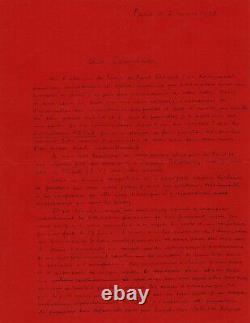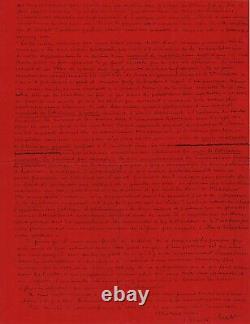
- Homepage
- Author
- Alfred Bruneau (3)
- Beydts (louis) (4)
- Camille Mauclair (3)
- Charles De Gaulle (3)
- Charles Monselet (3)
- Chateaubriand (5)
- Colette (3)
- Ernest Daudet (3)
- Eugène Labiche (3)
- Jean Couty (3)
- Jean-léon Gérôme (5)
- Louise Read (4)
- Marcel Proust (5)
- Paul Chabas (4)
- Paul Meurice (3)
- Proust (3)
- Roger Martin Du Gard (4)
- Salomon Reinach (3)
- Sully Prudhomme (7)
- Violette Leduc (4)
- Other (4028)
- Binding
- Era
- 18th Century (11)
- 1900 To 1960 (63)
- 1930s (4)
- 1960s (5)
- 1970s (7)
- 19th (5)
- 19th Century (48)
- 20th Century (15)
- Beautiful Era (12)
- Belle Epoque (49)
- First Empire (9)
- Nineteenth (19)
- Nineteenth Century (11)
- Post-war (23)
- Restoration (17)
- Revolution (4)
- Roaring Twenties (28)
- Second Empire (21)
- Second World War (6)
- World War Ii (9)
- Other (3737)
- Language
- Region
- Subject
André BRETON Signed Autograph Letter. Marx, Eluard, Communism and Surrealism




The Autographs of the Centuries bookstore has specialized for many years in the sale of autograph letters and manuscripts. Autographed letter signed to a contributor of the Surrealist Review. Two pages in-4° on blood red paper. For half a century, no Marxist has understood Marx.
Breton imagining the creation of a Marxist manual of general literature. "Dear friend, in the absence of Paul Eluard from Paris (being treated in a sanatorium in Haute-Savoie and expected to return in a week) I alone have read your letter. Surrealism in the service of the revolution, which I intend to publish very soon. Please let me know if I can use your name without harming you, I would be naturally sorry. I am very happy to hear that you are closer to Paris and look forward to seeing you at Easter.
Please call me at trinity 38-18 upon your arrival. Far from finding the question you ask strange, and even more so, unpleasant, I am on the contrary very sensitive to the trust it shows us.I will answer it as simply as you ask it. It is very interesting that you are currently teaching French literature and very striking also that you are considering consulting us on this matter. During a conference that I gave last February 23rd. [Breton had spoken about proletarian literature at the Grand Orient of France], under the auspices of the Association of Revolutionary Writers and Artists and which you may have read about in L'Humanité. I specifically emphasized the need to remedy in this area the inadequacy of school programs, on the one hand, and, on the other hand, to react against the tendency observed in revolutionary circles to consider with too much exclusive sympathy and often too blindly the works of writers who have taken the proletariat as their theme or who have been able to make use of simple revolutionary verbiage.
I cited, in support of this proposition, the very unfavorable judgment passed by Engels on Vallès and Zola and his very favorable assessments on the other hand on Balzac and Ibsen; he said he had learned more in the "Human Comedy" than "in all the books of historians, economists, statisticians of the time, taken together", "Ibsen has enormous historical importance," etc. Unable to send you a copy of this conference (which I also intend to publish), may I quote you this passage, - excuse me. "In the same way that we thought it necessary to set as the first practical task for the philosophical subsection created within the literary section of our organization the writing of a manual of dialectical materialism, it is only necessary to cite this aphorism by Lenin, excerpted from his unpublished Notes on Hegel in French: "One cannot fully understand Marx's CAPITAL and particularly the V.Chapter if one has not thoroughly studied and understood all of Hegel's logic. That is why, for half a century, no Marxist has understood Marx; in the same way, I say, that our role is to remedy, even if only in very modest proportions, this situation, it seems to me that one of the tasks that should be imposed on the literary section more particularly of our Association would be the elaboration of a Marxist manual of general literature aiming to clearly situate, to the exclusion of all others, the authors and works whose historical importance, from the very broad angle in which Engels leads us to consider them, appears today undeniable. As such a manual would necessarily be very concise, I could see it very well complemented, for our more knowledgeable comrades, by a series of Marxist courses in general literature taught at the Workers' University, which would seem to me to be very useful complement to the Marxist literature courses. For example, one could study successively French materialists, the political literature of the French Revolution, the romantic era, the main schools of historians, realism, naturalism, what truly deserves the name of French poetry in the 19th century. I would add that it would be very appropriate for the beginning of these presentations to include a critique and, if possible, an essay on the revision of the only Marxist theses we have on the question, which are Plekhanov's theses.
Our Russian comrades, by presenting them in issues 3 and 4 of Literature of the World Revolution, have already expressed extreme reservations about the political and philosophical opportunism of their author, and I believe that great literary and artistic reservations would also be appropriate. Nevertheless, these theses, almost all of which were borrowed from French literature and art, would provide us with a unique opportunity to define our position in relation to them and to objectify it. I think you will find it easy to deduce from this fragment the position that my friends and I believe should be taken in the face of a problem such as the one you pose. If you take into account the necessarily elementary nature of the indications below, which are aimed at an audience much more basic than yours, and if you only retain from these suggestions what can fit within the limits of a program like the one that is undoubtedly imposed on you and that I am unaware of, it seems to me that you can exert the same beneficial influence in this field as in that of philosophy. I am naturally at your disposal to provide you with any necessary details, if necessary. You would still need to let me know what your courses should focus on. Very touched by your trust, please believe me, dear comrade, your devoted André Breton. The review "Surrealism in the service of the revolution". Succeeded the review "The Surrealist Revolution". This one will have 6 issues. Check out our manuscripts The Autographs of the Centuries Gallery specializes in the sale and expertise of autograph letters and manuscripts of the great personalities of past centuries. Purchase / Payment methods We accept the following payment methods: Bank transfers and checks. The prices indicated are in euros and are net. We can also arrange shipments by private carrier at your request. Sales conditions In accordance with the customs of the International League of Antiquarian Booksellers, we accept a 14-day return guarantee. The return costs are borne by the buyer. About All the items offered are originals whose authenticity we guarantee. Our invoices serve as proof of authenticity of the pieces sold.However, at your request, we can issue a certificate of authenticity, for an additional fee.

